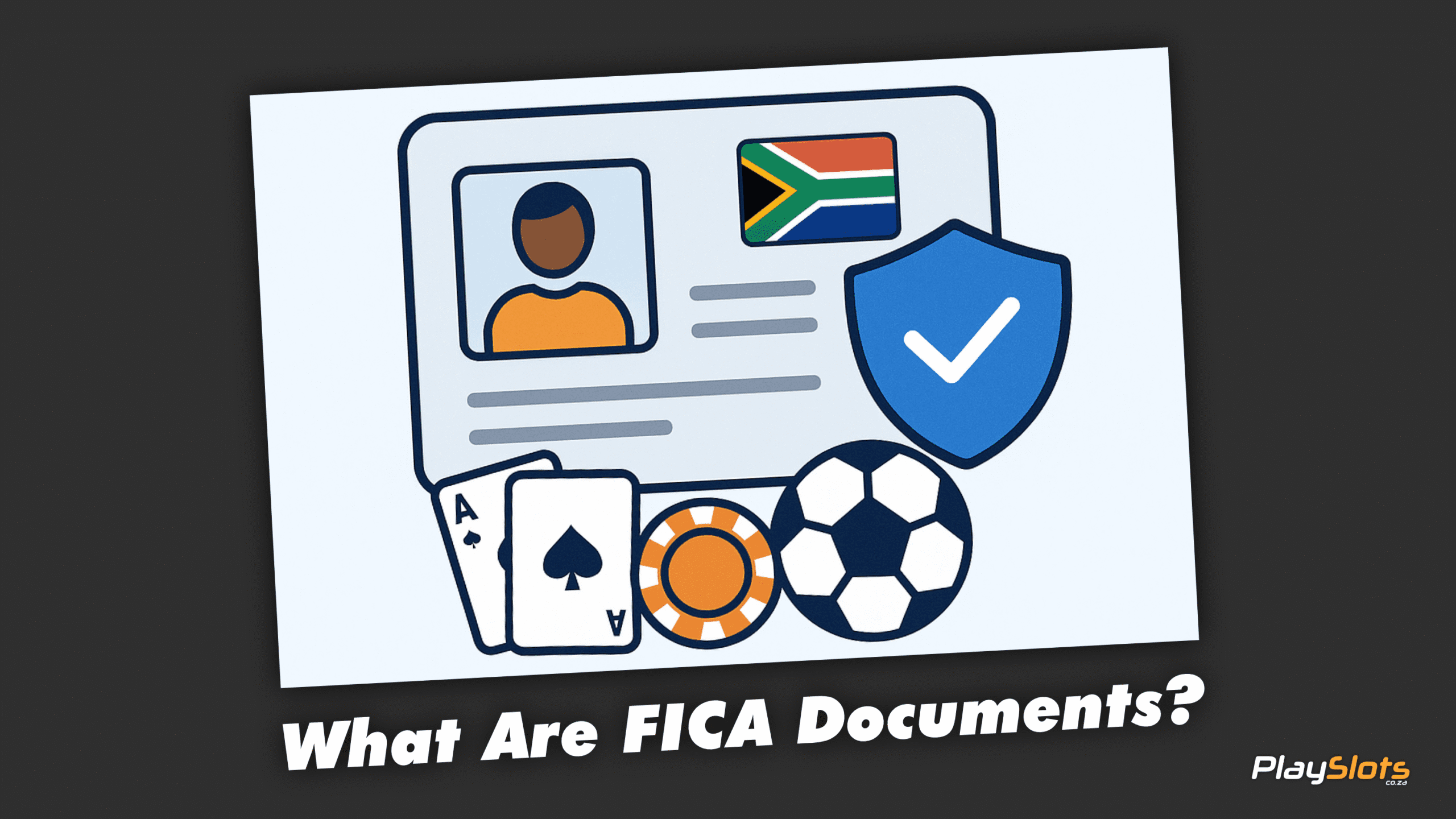What Are FICA Documents? A Simple Guide for Casino & Sportsbook Players

If you’ve ever signed up at a South African online casino or sportsbook, you’ve probably been asked to upload your ID and proof of address before making a withdrawal. That’s not red tape or some sneaky delay tactic; it’s the law. This whole process falls under FICA, a key part of South Africa’s efforts to keep gambling safe, legal, and free from shady activity.
FICA is part of South Africa’s broader strategy to combat money laundering and protect South African citizens from financial crime.
Let’s unpack what FICA actually means, why it’s essential, and how it affects your online gaming experience. FICA is similar to legislation found in other countries, aligning South Africa with international standards for combating financial crime.
What Is FICA and the Financial Intelligence Centre Act?
FICA stands for the Financial Intelligence Centre Act (Act 38 of 2001) (also known as the Intelligence Centre Act 38 of 2001), legislation created to help South Africa fight financial crime, money laundering, and terrorist financing. The Amendment Act further updates FICA to align with international standards and regulatory requirements, ensuring that South Africa meets its global compliance obligations.
The Financial Intelligence Centre (FIC) is the body responsible for enforcing this law. It gathers and analyses financial data to identify and prevent unlawful activities, working closely with banks, betting companies, and government agencies. Online casinos and sportsbooks are considered accountable institutions and reporting institutions under FICA.
These institutions have specific obligations under the Act, including reporting suspicious transactions and maintaining records. FICA requires accountable institutions to follow specific requirements, such as client due diligence, identification, and ongoing monitoring, to ensure compliance with the law and prevent money laundering and terrorist financing.
FICA also forms part of South Africa’s commitment to the Financial Action Task Force (FATF) — a global organisation that sets international standards to combat money laundering and terrorist financing.
In short, FICA helps make sure that the money circulating in our financial and gambling systems comes from lawful, traceable sources.
Why FICA Matters for Online Casinos and Sportsbooks
Every licensed online casino or sportsbook in South Africa is legally required to comply with FICA. That includes well-known names like Betway, Hollywoodbets, Lulabet, and other brands approved by the National Gambling Board and provincial licensing authorities. These licensed online casinos and sportsbooks are considered financial institutions and financial services providers.
Because online gambling involves real money transactions, these platforms fall under the category of accountable institutions. As financial institutions and financial services providers, they have a responsibility to comply with FICA regulations. That means they must verify who you are, where your money comes from, and whether your account is being used for a lawful purpose.
This protects everyone involved, it keeps criminals out of the system and ensures honest players like you can deposit, play, and withdraw safely. Complying with FICA is essential to maintain the integrity of the financial system.
The FICA Process for Online Gambling Accounts
When you open an account at a South African online casino, you’ll be asked to complete the FICA verification process before making your first withdrawal. The FICA process involves several processes required by law to ensure compliance and security. Here’s what that typically involves:
- Provide identification: a copy of your South African ID or passport.
- Proof of address – Usually a utility bill, bank statement, or official letter showing your name and residential address (not older than three months).
- Account verification – The casino checks that your details match and that your account has a lawful business relationship with the platform.
- Contact details – FICA requirements include providing accurate and up-to-date contact details to facilitate verification and communication.
FICA requires these steps to verify your identity, ensure only authorised individuals have access to accounts, and maintain compliance with regulatory standards.
Many casinos now allow you to upload these documents directly through your profile — no need to visit a branch or send emails. However, some players may need to visit their nearest branch to complete verification if online submission is not possible. In such cases, visit your nearest branch to finalise the process and ensure your account is fully compliant.
Once verified, your account becomes fully FICA-compliant, enabling smooth deposits and withdrawals.
It might sound like admin, but it’s a crucial step to protect both players and institutions from fraud, money laundering, and terrorist financing.
Key FICA Terms Explained
Accountable Institutions
Under the FIC Act, certain businesses, including banks, estate agents, foreign exchange services, and gambling operators, are classified as accountable institutions. They’re required to monitor transactions, identify clients, and report anything suspicious to the Financial Intelligence Centre.
Suspicious or Unusual Transactions
Casinos and sportsbooks must flag any suspicious or unusual transactions, including those without a clear business or lawful purpose, such as multiple large deposits, rapid withdrawals, or inconsistent betting patterns.
Attempted evasion of tax, duties, or levies is also considered a suspicious transaction and must be reported. These reports help detect money laundering, tax evasion, attempted evasion, and other unlawful activities.
Combating Financial Crime and Terrorist Financing
FICA plays a significant role in protecting South Africa’s financial ecosystem from criminal activity, including money laundering, terrorist financing, and terrorist-related activities.
Licensed casinos and sportsbooks must implement processes to monitor and report suspicious activities, oversee all business relationships, report unusual transactions, and maintain detailed client records for several years.
They also pay a levy imposed by the FIC, which helps fund national oversight efforts and strengthens collaboration between supervisory bodies and intelligence services.
For online gambling, this means your favourite betting site isn’t just about spins and wins, it’s also a frontline defender against financial abuse.
The Role of the National Gambling Board and Provincial Licensing
While the Financial Intelligence Centre enforces FICA, compliance within the gambling industry is also monitored by the National Gambling Board (NGB) and the provincial licensing authorities.
Each province, such as the Western Cape or Gauteng, has its own legal framework for licensing gambling operators. These authorities ensure that every approved casino or sportsbook meets both gambling and FICA standards.
That’s why when you play on locally licensed platforms, you’re protected under South African law. Offshore or unlicensed sites, on the other hand, don’t have to follow these rules, meaning there’s no guarantee your money or data is safe.
Common FICA FAQ’s
Staying Compliant as a Player
Here are a few tips to stay on the right side of FICA and avoid unnecessary delays:
- Always provide accurate personal details when registering.
- Keep your documents up to date — especially your proof of address.
- Don’t share accounts or make deposits for other players.
- Only play at licensed, FICA-compliant casinos listed on trusted sites like PlaySlots.co.za.
Remember, FICA isn’t about making things difficult. It’s about ensuring that online gambling in South Africa remains safe, transparent, and fair for everyone involved.
Final Thoughts
FICA may seem like just another hoop to jump through, but it’s one of the main reasons South Africa’s online gambling industry is trusted and well-regulated. By verifying every player and monitoring transactions, FICA helps keep the industry free from money laundering, terrorist financing, and other unlawful activities.
So, next time a casino asks for your documents, remember: it’s not a hassle, it’s protection. Your compliance keeps your account secure, your winnings safe, and the entire gaming community above board.





